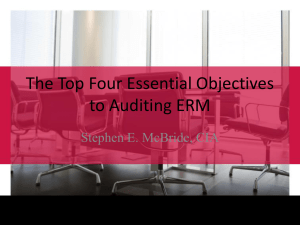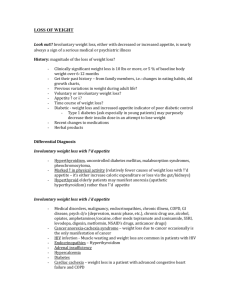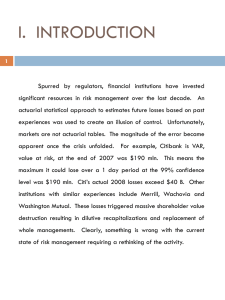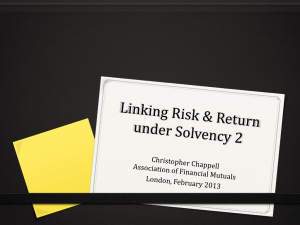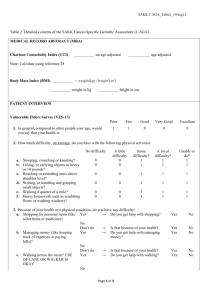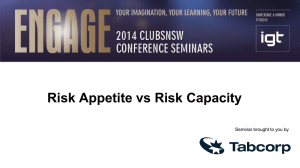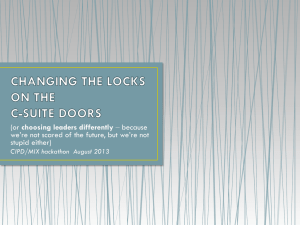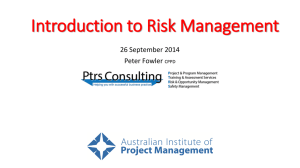Risk Appetite: The Link Between Strategy and Capital
advertisement
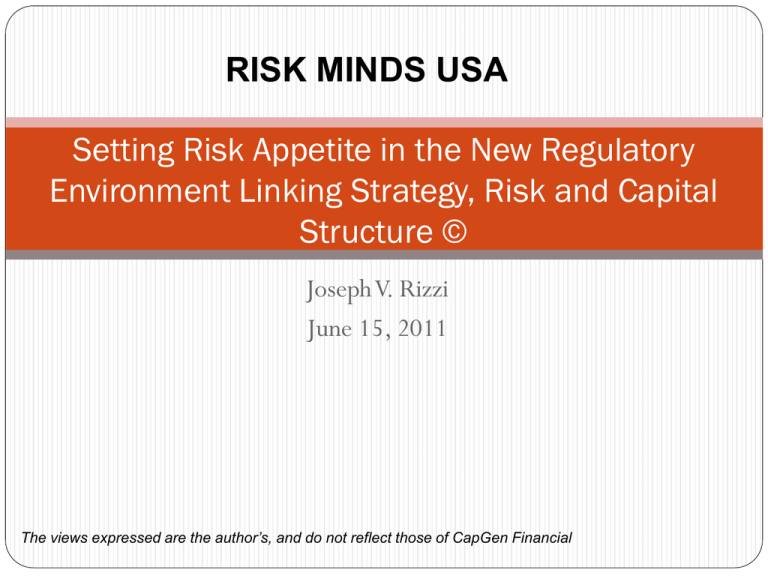
RISK MINDS USA Setting Risk Appetite in the New Regulatory Environment Linking Strategy, Risk and Capital Structure © Joseph V. Rizzi June 15, 2011 The views expressed are the author’s, and do not reflect those of CapGen Financial 2 1 Introduction 2 Risk Appetite 3 Capital Structure 4 Conclusions 1. INTRODUCTION 3 Introduction (Risk Appetite as a Process… Need to incorporate capital structure and risk considerations as an input versus consequence of strategy Capital as cost of risk Return as cost of capital Risk as cost of return Risk appetite links strategy, risk and capital –represents total risk exposure an organization is willing (and capable?) to accept and retain in pursuit of its strategy … Not a Number) 4 Introduction (cont) Volatility (Once set… Strategic Capital Budgeting (CEO) Liquidity Capital Structure CFO Capabilities Risk Appetite Return Risk Management (CRO) Opportunities Correlations Performance External Stakeholders Shareholders Risk/Return Regulators Governance Rating Agencies 5 …Risk appetite is continuously monitored and revised) Introduction (cont) (Governance Puzzle: How to resist excessive risk Governance Monitoring and Rebalancing Investment Strategy And Risk Appetite Performance (Asymmetric information) …taking in benign markets) 6 CAPGEN FINANCIAL 2. RISK APPETITE 7 (Return on equity value illusion… 8 …Confusing key performance Indicators with value drivers) Implications of Risk Appetite Charges (Not all Risk is the Same… Capital Requirement Return B A Efficient Frontier (Beta) D C Rf E A – Current B – Target D – C = Capital Need to Support Target EF = Increased Risk Appetite 9 F Risk …Cost of Risk is Capital) (High Returns Evidence of Skill…… 10 … Or Extreme Risk Taking?) Problem – Procyclical Risk Appetite (Risk Appetite Changes are Prone to Behavior Bias and Drift… High Low Risk Appetite Bull Market State Bear Strong 2003/06 2007 2008 2009 Capital Weak Risk Reinforcement •Budgets and Bonuses - KillerBs hard to recognize risk if you are paid not to do so •Preoccupation with Growth – Barclays? •Herding 11 … and vary over time depending on wealth) 3. CAPITAL STRUCTURE 12 Capital Structure – Integration of Capital and Risk Management Risk never disappears…. Mix of securities (Capital Structure) and Risk Management Products Capital structure optimization is the purpose of risk management – 2 sides of same coin Risk management is capital structure in disguise Risk management as synthetic or substitute equity Approaches Risk transfer transfer (Cause) Risk Finance (Effect) Integration of corporate finance and risk management Cost/Benefit analysis regarding use of risk management or risk finance Issue is whether it is more efficient to (self insure) hold capital or to use risk management to eliminate the risk cause 13 ---someone is always on the other side of the trade Stakeholder Views of Capital Differ Is the glass half full or half empty Rating Agencies Capital focus is primarily on tangible equity capital and capital replenishment capabilities. Regulators Concern on through the cycle capital and Shareholders Are focused on capital discipline and buffers allocation Management Capital Returns and bonuses … it depends on whether you are pouring or drinking 14 Capital Guidelines (How much is enough?… S&P: RAC Very strong >15% Strong 15/≤ X <10% Adequate 10 ≤ X < 7% Moderate 7% ≤ X < 5% Weak 5% ≤ X < 3% Very Weak >3% CAMELS – “C” and “A”:Classified Assets/T1 + ALL 1 - O ≤ X ≤ 25% 2 – 26%< X ≤ 40% 3 - 41% < X ≤ 80% 4 - 81% ≤ X ≤ 100% 5 - > 100 15 CAPGEN FINANCIAL …it depends Scenarios: To Assess Possible Strategies Against Capital Structure Robustness (Can I survive and tolerate….. 16 The upside (U) and base (B) cases generate excess capital which points toward shareholder distributions The downturn (D) scenario suggests possible changes in risk appetite and the development of appropriate contingency plans to maintain ratios, sell assets and raise capital. Forward looking Core Tier 1 development under alternative scenarios (Stress testing) Core Tier 1 Ratio Financial policy implications: U ------------------------B ------------------------- Return Capital Raise/release Capital Probably Unlikely May be May be Unlikely Probably D T …the worst plausible outcome?) Decisions at Risk (DAR) Control Framework (Who decides… …And how do they decide?) 17 Elements of Strategy Based Capital Structure Management (Risk and capital as inputs into strategic planning….) Choice of Markets with Attractive economics in which the organization enjoys a competitive advantage Strategy Risk Appetite Risk the organization is willing and able to accept in pursuit of its strategy Risk Assessment Risks underwritten and retained Capital Need and Capital relative to Ratings Agencies, Regulators and peers Actual Capital Capital Assessment Return capital to shareholders when actual capital exceeds need, or raise capital when exceeds actual capital Capital Plan Allocation to business units based on an economic capital determination 18 Capital Allocation (…and not just consequences) 4. CONCLUSION 19 Conclusion Manage risk but…… Risk is not volatility Beware procyclical risk appetite Set too high in good times Reduced during bad times Avoid just-in-time capital structures Wealth dependent risk appetite is the primary determinant of tipping points with leverage as an amplier …. live with uncertainty 20
